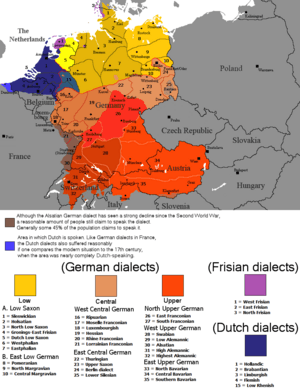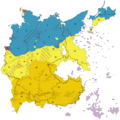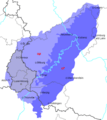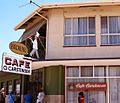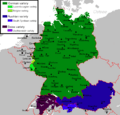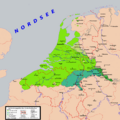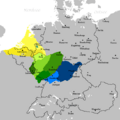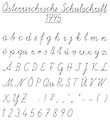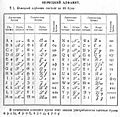German language facts for kids
Quick facts for kids German |
|
|---|---|
| Native to | Primarily in German-speaking Europe, as a minority language and amongst the German diaspora worldwide |
| Native speakers | Standard German: 90–100 million (2005–2010) all German: 120 million (1990–2005) L2 speakers: 80 million (2006) |
| Language family |
Indo-European
|
| Early forms: |
Old High German
|
| Writing system | Latin (German alphabet) German Braille |
| Official status | |
| Official language in | (official and working language)
|
| Recognised minority language in | |
| Regulated by | No official regulation (German orthography regulated by the Council for German Orthography (Rat für deutsche Rechtschreibung)). |
The German language (called Deutsch in German) is a West Germanic language. It belongs to the larger Indo-European language family.
About 100 million people speak German as their first language. It is spoken mainly in Germany, Austria, Switzerland, Liechtenstein, and Luxembourg. German is the most common native language in the European Union.
You can also find German speakers in parts of Belgium, the Netherlands, France, and northern Italy. Many people who moved from Germany to other countries, like the United States and Canada, also speak German. It is also spoken in some parts of Eastern Europe, such as Bulgaria, Romania, and Russia.
Contents
What is German Like?
German is part of the West Germanic language family. This means it is related to languages like English and Dutch. Many German words are similar to English words.
However, German grammar is more complex than English. German uses a system called cases. This means that words change their form depending on their role in a sentence.
When you use helping verbs in German, the main verb often moves to the end of the sentence. For example, "Someone has stolen my car" becomes Jemand hat mein Auto gestohlen (which means "Someone has my car stolen").
Capital Letters in German
In German writing, every noun must start with a capital letter. Long ago, English and Danish also had this rule, but they don't anymore. Today, German is the only language that still uses this rule.
Swiss German Dialect
German is an official language in Switzerland. However, the Swiss dialect of German can be hard for native German speakers from Germany to understand. Even Swiss people who don't speak German as their first language might find it difficult.
One reason for these differences is history. During World War II, German Swiss people wanted to show they were different from the Nazis. So, they chose to speak their local Swiss dialect instead of standard German.
Swiss German also has some differences in writing. For example, the letter ß (called "Eszett" or "sharp S"), which is only found in German, is always written as ss in Swiss German.
German Dialects
German has many different dialects. A dialect is a way of speaking a language that is specific to a certain area. Here are some common German dialects:
- Alsatian
- Bavarian dialect
- Franconian Dialect
- Kölsch
- Low Saxon
- Swiss dialect
- Mannheimerisch dialect
- Palatinate German
German Words Used in English
English has borrowed many words from German. Often, these words are used in English with almost no changes to their spelling. Sometimes, the special German umlaut marks (like the two dots over a letter) are removed, and nouns are not capitalized.
| German word | English word | Meaning in German |
|---|---|---|
| Angst | angst | fear |
| Blitz | Blitz | flash or lightning |
| Bratwurst | bratwurst | fried sausage |
| Doppelgänger | doppelgänger | a look-alike of someone |
| Ersatz | ersatz | a replacement, often not as good as the original |
| Fest | fest | a feast or celebration |
| Gedankenexperiment | gedankenexperiment | a thought experiment |
| Gesundheit! | Gesundheit! (Amer.) | health / bless you! (when someone sneezes) |
| Glockenspiel | glockenspiel | a musical instrument with metal bars |
| Hinterland | hinterland | the area behind a coast or a city |
| kaputt | kaput | broken or not working |
| Kindergarten | kindergarten | literally "children's garden" – a preschool |
| Kitsch | kitsch | art or objects that are considered to be in bad taste |
| Leitmotiv | leitmotif | a guiding theme or idea |
| Poltergeist | poltergeist | literally "rumbling ghost" |
| Rucksack | rucksack | a backpack |
| Sauerkraut | sauerkraut | fermented cabbage |
| Schadenfreude | schadenfreude | taking joy in someone else's bad luck |
| Wanderlust | wanderlust | a strong desire to travel |
| Wunderkind | wunderkind | literally "wonder child" – a child prodigy |
| Zeitgeist | zeitgeist | the spirit or mood of a particular period of history |
Learn Some German Words
Here are some basic German words and phrases to help you get started!
Numbers in German
| null | zero |
| eins | one |
| zwei | two |
| drei | three |
| vier | four |
| fünf | five |
| sechs | six |
| sieben | seven |
| acht | eight |
| neun | nine |
| zehn | ten |
| elf | eleven |
| zwölf | twelve |
| dreizehn | thirteen |
| vierzehn | fourteen |
| fünfzehn | fifteen |
| sechzehn | sixteen |
| siebzehn | seventeen |
| achtzehn | eighteen |
| neunzehn | nineteen |
| zwanzig | twenty |
Common German Words
| ja | yes |
| nein | no |
| ich | I |
| du | you (used with friends or family) |
| er | he |
| sie | she |
| es | it |
| wir | we |
| ihr | you (used for a group of friends) |
| Sie | you (polite, used with adults or strangers) |
| sie | they |
| Schweiz | Switzerland |
| Österreich | Austria |
| Deutschland | Germany |
| wer | who |
| wie | how |
| wo | where |
| was | what |
| der | the (for masculine words) |
| die | the (for feminine words) |
| das | the (for neutral words) |
Basic German Phrases
| Guten Morgen | Good morning |
| Guten Abend | Good evening |
| Guten Tag | "Hello" (used during the day) |
| Gute Nacht | Good night |
| Wie geht es dir/Ihnen/euch? | How are you? |
| Mir geht's gut, danke! | I'm fine, thank you! |
| bitte | please (can also mean "you're welcome") |
| danke | Thank you |
| Auf Wiedersehen | Goodbye |
| Ich heiße ... | My name is ... |
| Wie heißt du?/Wie heißen Sie? | What's your name? |
| Entschuldigung/Entschuldigen Sie | Excuse me |
| Woher kommst du?/Woher kommen Sie? | Where are you from? |
| Ich komme aus Deutschland/Österreich | I'm from Germany/Austria |
| Wo wohnst du?/Wo wohnen Sie? | Where do you live? |
| Was ist los? | What's up? |
| Entschuldigen Sie. Wo ist der Bahnhof? | Excuse me. Where is the train station? |
| Wie viel kostet dieser Pullover? | How much is this pullover (sweater)? |
| Wie viel kostet diese Jeans? | How much are these jeans? |
| Frau | Mrs., Ms. |
| Herr | Mr. |
Images for kids
-
The Germanic languages in contemporary Europe
-
German language area and major dialectal divisions around 1900.
-
(Swiss) German is one of four national languages of Switzerland, and it is spoken in seven of the country's ten largest cities.
-
Luxembourg lies in the Moselle Franconian dialect area.
-
Bilingual German-English sign at a bakery in Namibia, where German is a national language.
-
Self reported knowledge of German as a foreign language in the EU member states (+Turkey), in per cent of the adult population (+15), 2005
-
The Deutsches Wörterbuch (1st vol., 1854) by the Brothers Grimm
-
Austria's standardized cursive
-
Germany's standardized cursive
See also
 In Spanish: Idioma alemán para niños
In Spanish: Idioma alemán para niños
 | Isaac Myers |
 | D. Hamilton Jackson |
 | A. Philip Randolph |


